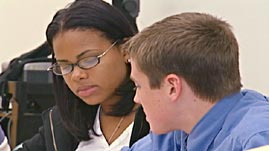Teachers' Domain - Digital Media for the Classroom and Professional Development
User: Preview

Source: La Plaza: "Bus to the Burbs"
In 1954, the Supreme Court ruled in Brown v. Board of Education that segregated schools were unconstitutional. While America turned its attention to the immediate resistance and ensuing violence in the South, the controversy over integrated schools lay dormant in the North. The landmark Brown ruling challenged the de jure (by law) segregation common in the South, but it didn't address the de facto (in fact) segregation more common in the North. Although not written into law, segregation "in fact" existed in the North. In Boston, Massachusetts, housing patterns revealed segregated neighborhoods, and because children were assigned to neighborhood schools, the schools were in fact segregated.
Inadequately funded, black schools had fewer resources, inferior facilities, and poorly paid teachers. For years, the NAACP and black parents in Boston argued for better conditions and equal education. The independently elected school committee countered that the social conditions that led to segregated housing patterns, and thus segregated schools, were beyond their control. The courts would later find that the school committee alone had the power to decide who attended each school.
In the early 1960s, civil rights advocates staged boycotts to protest the conditions in Boston's black neighborhood schools. In 1965, the state legislature recognized the problem of segregation and passed the Racial Imbalance Act, which demanded that districts eliminate segregated schools. But without the support of the school committee, the act had no impact. By this time, a small group of black parents had already begun a busing program, dubbed Operation Exodus, that transported their children to a white school with more resources, just beyond their neighborhood.
In 1966, with funding from the state, the program evolved into the Metropolitan Council for Educational Opportunities (METCO), a voluntary busing program designed to end racial isolation. It allowed interested minority students from segregated urban schools to attend predominantly white schools in participating suburban school districts.
Over the years, the demand for METCO increased, but the state funding stayed the same. In the 1990s, Boston's growing urban Latino and Asian population vied for access to METCO. Because funding didn't expand, making room for other racial and ethnic minorities meant that fewer black students were eligible. (In the 1960s, African Americans made up 100 percent of METCO applicants; by the mid-1990s, they made up 71 percent.)
What had started with 200 students in 1966 grew to 3,200 by 1996, with many of those students traveling an hour in each direction to attend better performing schools. A 1997 study conducted by Harvard University's Civil Rights Project showed METCO's successes: 91 percent of students participating in the METCO program reported excellent experiences in getting along with people from different backgrounds, and more than 86 percent of METCO's graduates went on to college, compared to 65 percent of Boston Public School students.
As of 2004, METCO served 3,130 minority students in the Greater Boston area. The waiting list to participate in the program was more than 15,000; the last budget increase was in 1981.
 Loading Standards
Loading Standards